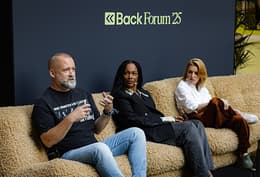
Or so Smartphone Free Childhood co-founder Daisy Greenwell believes. And she’s not alone. Since setting up the UK initiative to delay children’s exposure to a smartphone until they turn 14, 140,000 parents nationwide have signed the register.
“People say it’s too late and there’s nothing we can do about kids – from 3-years-old and upwards – regularly using smartphones…” explains a passionate Daisy Greenwell, “but that’s bullshit!”
This mother of three, and the co-founder (along with husband Joe Ryrie) of the fast-growing Smartphone Free Childhood movement, continues: “We’re not saying we should eliminate smartphones altogether, or that they haven’t done a lot of good for society, because they have! But there’s also no doubt they’re bad for our children’s mental health, and our kids are being exposed to them far too early in their mental development. "
“It’s like yes, cars are great, but then loads of people die in accidents, so we added seat belts to make them safer, right? We created pollution laws around cars and designed better roads! Just because something is unavoidable in society doesn’t mean we can’t make it better or safer.”
“I think we all naively assume that by the time we have children ourselves, the issues around smartphone exposure will somehow be figured out ... It’s a systemic issue that goes from the government to the schools, with teachers now losing hours and hours of work time due to sorting things out like cyberbullying on social media.”
The research seems to back up Greenwell’s claims. Compared to a year ago (2024), a higher proportion of 5-7s go online to send messages or make voice/video calls (59% to 65%) or to watch live-streamed content (39% to 50%) in the UK, according to Ofcom.
Similarly, overall use of social media sites or apps among all 5-7s has increased year-on-year (30% to 38%), with WhatsApp (29% to 37%), TikTok (25% to 30%), Instagram (14% to 22%) and Discord (2% to 4%) seeing particular high growth among this formative age group. With smartphone adoption now so vast, there’s more children in close proximity to these devices, and some parents even rely on phone videos to “calm” their children down during testing moments.
Subsequently, this means more and more small children are gaining fingertip access to all the negatives - cyber bullying, porn, violent images, unrealistic beauty standards, hate speech, misogyny, transphobia, racist memes etc - that naturally come along with these services. Another global study of 27,969 young adults by Sapien Labs, rather worryingly concluded that: “The younger the age of getting the first smartphone, the worse the mental health that the young adult reports today.”
To counter this concerning backdrop of young people being exposed to this technology far too early in their development, the Smartphone Free Childhood movement is campaigning for better laws through its events (which are live at schools and online via webinars), while also aiming to give concerned parents a community platform in which to fight back as a collective.

Anthea Renshaw
“The Parent Pact”, a register that Greenwell has created, instantly shows a list of parents in the local community who’ve agreed to delay their child’s exposure to a smartphone until they turn 14. By signing up, you get access to a local WhatsApp support group, where parents can connect and give each other tips on how to steer their kids away from toxic smartphone use. So far, there have been 140,000 signatures across the UK. Greenwell predicts this will hit a million within two years.
It’s all very impressive when you consider that Smartphone Free Childhood was only created in February 2024. “The Parent Pact is like positive peer pressure,” Greenwell explains. “You see that 5 or 6 other kids in the class are signed up, and you don’t want your child to be left out, so you sign up as well. It only takes 25% of a group to create a tipping point culturally.”
A former journalist at The Times and Positive News, Greenwell first created Smartphone Free Childhood as a WhatsApp support group after learning a fellow parent at school was considering buying an iPhone for their 8-year-old child. The group evolved into a national movement, getting so big that she and her husband quit their jobs just to manage it. “I couldn’t believe it: 8!” she recalls.
“I think we all naively assume that by the time we have children ourselves, the issues around smartphone exposure will somehow be figured out. But I realised at that moment that kids are using them younger than ever before, despite the fact that there’s endless toxic content and addiction issues. It’s a systemic issue that goes from the government to the schools, with teachers now losing hours and hours of work time due to sorting things out like cyberbullying on social media.”
Of the specific mental health issues that smartphone use in younger children can create, the co-founder adds: “I think anxiety and depression are the biggest negatives, for sure. If you’re letting someone use a smartphone regularly as a small child, you’re rewiring their brain so it needs constant dopamine hits just to feel engaged. This destroys a child’s focus and ability to get into a concentrated state. It distorts your child’s sense of who they are, and this ultimately stunts their emotional development.”

So, what's next? Aside from the target of a million users, Greenwell says there are plans to take the Smartphone Free Childhood movement global, having already received “concrete interest” from countries as far as Kenya to Brazil, and Uzbekistan. She also wants to continue putting pressure on politicians and the big tech companies, even if this process can sometimes feel like an uphill battle.
“I would say that the current UK government is not looking like they want to make any legislative changes on this issue right now,” Greenwell concedes. “And I think that's probably because of the situation with geopolitics and tariffs; Trump says that anyone putting regulation onto American companies is impinging on free speech! Sadly, big tech just isn't engaging with us. You hear Mark Zuckerberg talking for 3 hours on a podcast and he doesn’t mention child safety online once, despite it being on the top ten priority list at Facebook.”
Regardless, it’s obvious the Smartphone Free Childhood movement will continue to fight against the tide, hoping to show adults that it’s possible iPhone use can be responsibly managed for their children. Asked what advice she’d give to parents hoping to introduce a fresh smartphone ban into their households, Greenwell concludes: “There's going to be two weeks of hell, but after that you will see your child regain an interest in the world and a lot more self-confidence.
“If you're on your phone the whole time, they're just going to copy you and you then don't have a leg to stand on, so you have to lead from the top and show kids there’s more to life than just a device in their pocket.” Greenwell pauses, laughing: “In the last year we’ve been on our phones so much, as we work to expand this movement! My daughter jokes that we should start a smartphone-free adulthood next.”

Amy Ruffell
Amy Ruffell, TV producer and mother of two from Cambridge
Ruffell has been bringing her community together to sign the Parent Pact and go smartphone-free, hosting regular progress meetings between parents and teachers. We spoke to her about her role in the Smartphone Free Childhood movement.When I read one of the first articles about SFC, I sent it to my wife, and she reminded me that I had been talking about my concerns about tech and children from when I was pregnant with our first child. My thoughts at that time were 'if this is what it's like now for kids, what will it be like in 12ish years when he has to deal with the online world.' I found that concept alarming. The movement provided a solution I was searching for.
My children are too young for their own devices (and will be for some time now, thanks to this community) but it has made me think carefully and mindfully about my own (poor) overuse of tech. I now try to model better behaviour to them.
Opportunity loss. These devices are great in small, carefully curated doses but they contain a world of addictive design that is infinitely more interesting to our brains than the normal in real-life world. The things our children could/should be doing with their time if they're not caught early in doom-scrolling loops are critical to their development.
We've seen a number of schools send out information about the parent pact and communities come together to share information in talks and events here in Cambridge. Some of it is 'preaching to the choir' because so many people are crying out for solutions to the concerns, but some people do not realise what is at stake and often when they do scratch the surface of the research it's pretty sobering for them because everyone wants the best outcome for everyone's kids and this is a situation we have slept-walked into as a society.
I have heard a lot of heartbreaking stories at this point. Children are bullied, horrified, or frightened by age-inappropriate content that they didn't seek out, they're desensitised to material that is seriously violent or graphic, and they criminalise themselves through the sharing of material that has become 'normal' to them. I find it very unfair that we put our children into this position when we should be protecting them from the worst of it.
The movement is important. I think most people involved don't really mind how we get there, but agree we must get to a point where it is not considered normal to give a child their own internet-enabled device in year 6 (or often younger) just because everyone else is doing it. My hope for the future is that we look back at this period and wonder how we let children have such free access to devices and material that is not helpful and in many cases damaging their development and happiness because we have accepted as a society that children making real life connections and playing and interacting in the real world is far, far more positive than allowing them to become trapped in a virtual one.















